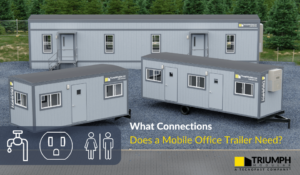For schools looking to add crucial space, modular classrooms offer a solution with several benefits—especially when compared to traditional construction.
You get cost predictability, speed to occupancy, and much more.
However, just like traditionally-built structures, modular classrooms need to follow the regulations, codes, and permits for both the state and the country.
What Permits Are Needed For Modular Classrooms?
Although permits for modular classrooms (and buildings in general) vary from state to state, in general, you can expect four different types of permits:
- Building permits
- Trade permits
- Occupancy permits
- Road transportation/highway permits
Building Permits
A building permit is an overarching permit that allows construction to commence on a new building or additions to an existing building. Obtaining a building permit, in most states, involves going to the building department and filling out an application after the engineered plans for the building have been drafted and submitted. The approval process could take several weeks or even months, depending on the extent of the engineered plans.
Building permits are also necessary for changes made to a building, enlarging the building, and even some repairs or renovations.
Trade Permits
Trade permits are needed to perform the site work required for the building to function as planned.
There are three common types of trade permits needed:
- Mechanical permit – Mechanical permits allow for installing ventilation systems for heating and cooling. It also includes the installation, repair, or alteration of gas piping and the installation of any vented appliances, such as bathroom fans.
- Electrical permit – Electrical permits are, as the name suggests, required for any electrical installation, repairs, or alterations. This also includes any communication wiring.
- Plumbing permit – Plumbing permits enable the installation of all the building’s plumbing fixtures and piping required.
Occupancy Permits
Occupancy permits are required before using any type of building—including modular classrooms.
This permit shows that a building has been inspected and deemed fit and safe for occupancy based on the execution of approved plans and sign off by the engineer.
Road Transportation/Highway Permits
Since modular construction largely takes place off-site, units will need to be delivered to the site itself.
In most cases, this will require road transportation or highway permits. These permits allow trucks to deliver larger cargo on normal city highways and through the streets, depending on where the units are going.
The specific permits required may depend on the state that you’re in—and if the units need to cross state lines. It’s best to contact your local building department for more information.
How Can Triumph Modular Help With Permits?
Obtaining all the permits necessary for modular classroom additions can seem overwhelming, but don’t worry.
With Triumph Modular as the general contractor, we’ll obtain all the permits you need for your project with no fuss. It’s part of the process of working with us!
Resources For States in New England
For those who want more information on specific states in New England, here are some useful links to building code information specific to several states:
Find Out More About Permits and Other Modular Classroom Information in Our Ebook
Looking for more modular classroom information?
Our latest ebook, the Guide to Modular Classrooms, has everything you need to know about modular classrooms before starting your next project—including permit information.
Download our ebook today and start your project off on the right foot!




